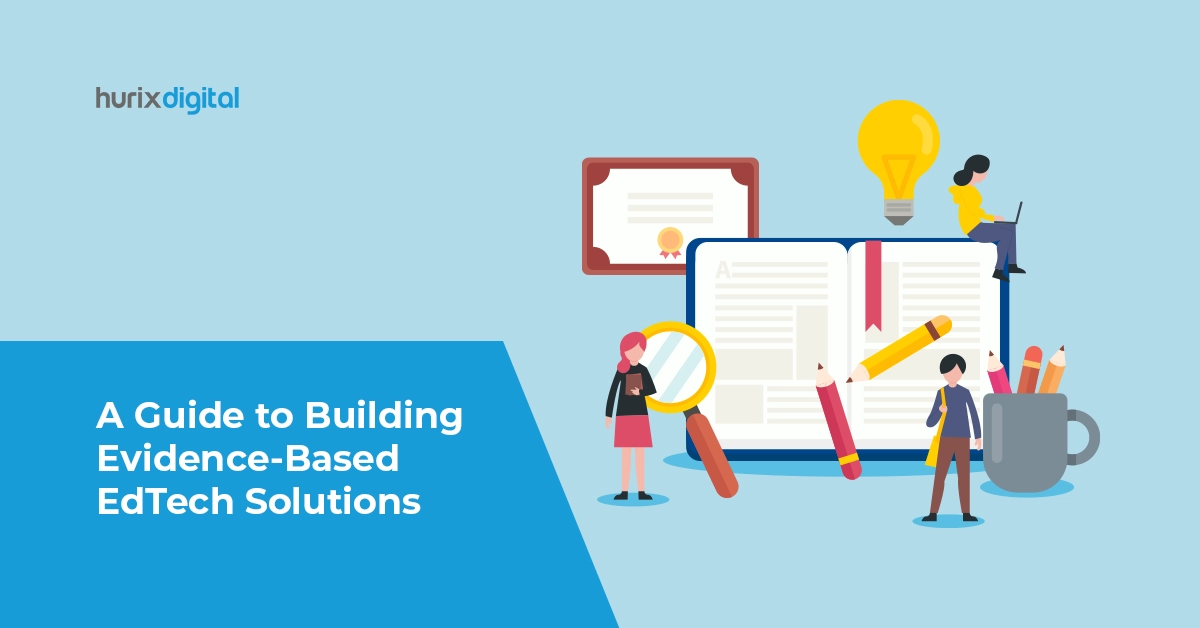
A Guide to Building Evidence-Based EdTech Solutions
Summary
Discover how to develop evidence-based EdTech solutions. This article provides insights into creating educational technologies that are grounded in research and proven effectiveness.
Amidst the COVID-19 pandemic, while many industries faced challenges, one sector saw unprecedented growth: ed-tech. Companies offering comprehensive solutions turned challenges into opportunities, with no signs of slowing down.
The ed-tech market is projected to reach $347 million by 2031 (CAGR 19.1%). As education technology evolves, evidence-based tools redefine education’s future. But what exactly is evidence-based ed-tech, and how does it reshape pedagogy? We answer this in this post. Read on!
Table of Contents:
- What is Evidence-Based Education Technology?
- Significance of Evidence-Backed and Data-Driven Ed-Tech Solutions
- Challenges in the Implementation of Evidence-Backed Education Technology
- How to Incorporate Evidence-Based Practices in Education Technology?
- Final Words
What is Evidence-Based Education Technology?
Evidence-based ed-tech solutions act as a benchmark for building innovative and robust learning tools.
Advanced educational technology solutions are grounded in data showing effectiveness in addressing specific educational challenges. These practices provide a strong foundation for new-age learning methodologies based on research-based studies to create effective strategies.
Based on pragmatic data, advanced educational technology solutions are based on evidence showing effectiveness in addressing specific educational challenges. These solutions are designed to meet educational needs through a data-driven approach, which involves using research findings and empirical evidence to inform the development and implementation of technology tools in educational settings.
Also Read: An Expert’s Guide to Instructional Design in Higher Education
Significance of Evidence-Backed and Data-Driven Ed-Tech Solutions
One of the most significant advantages of data-driven ed-tech solutions lies in their overall impact on better student learning outcomes. These solutions go beyond digitizing classrooms. They are dynamic platforms that are designed to create an augmented learning experience based on factual data and proofs backed by extensive research.
Let’s consider an elementary language app as an example for more clarity. These apps are designed to give a basic understanding of a foreign language and are backed by strong teaching principles.
By integrating interactive problem-solving techniques, these apps not only engage the learners but also enhance their linguistic abilities.
Here are some key advantages of impactful ed-tech implementation:
1. Personalized Learning Journey
Each learner is different, and so are their cognitive abilities. Some students can easily grasp a new concept, while others are slow learners. So, personalized learning paths are becoming more crucial than ever. Today, adaptive ed-tech solutions use evidence-based algorithms to analyze each learner’s performance and provide recommendations tailored to each student’s needs.
2. Evidence-Informed Instructional Design
Data-driven ed-tech solutions supported by strong proof provide educators with valuable and actionable insights into various pedagogies. This facilitates the creation of well-informed policies that support better curriculum design and improved learning outcomes.
3. Better Curriculum Design
Evidence-backed ed-tech solutions offer the right tools and resources for designing and delivering interactive curricula. Educators can integrate multimedia-rich lessons and formative assessments to meet the expectations of different types of learners.
The benefits of incorporating data-driven teaching tools are endless. But every good thing comes with several roadblocks. As we move further, let’s see some of the common challenges in impactful EdTech implementation.
Challenges in the Implementation of Evidence-Backed Education Technology
Nothing comes easy! And it’s so true when it comes to implementing advanced evidence-backed education technologies. Navigating this landscape comes with a set of hurdles. Knowing and addressing these obstacles is critical to successfully building an evidence-based ed-tech solution.
Below are the
1. Access to High-Quality Data and Evidence
Building proof-backed ed-tech solutions requires high-quality data. Most developers encounter challenges in accessing comprehensive and holistic information. Outdated or inadequate data can compromise the efficiency of research-based educational technology.
2. Data Privacy
Staying compliant with data privacy while gathering, scrutinizing, and utilizing research data is a huge obstacle. Ed-tech solution providers need to steer through the complicated world of privacy laws and other guidelines to ensure responsible and ethical data usage.
3. Limited Resources and Time Constraints
With minimal resources, developers often face challenges in striking a balance between time-sensitive research and its implementation in real-life scenarios.
How to Incorporate Evidence-Based Practices in Education Technology?
Addressing these challenges is critical to impactful ed-tech implementation. By adopting these holistic strategies, you can build education technologies anchored in empirical data and pedagogical efficiency.
1. Ensure Data Compliance Aligned with Curriculum Design
Compliance with data privacy regulations and standards is the key to impactful ed-tech implementation. Ensure you have robust data security measures in place to safeguard user trust and ethical data usage.
One way to maintain data privacy and stay compliant is to apply for certifications such as the Family Educational Rights and Privacy Act (FERPA) or the Children’s Online Privacy Protection Act (COPPA).
Also, collaborate with industry experts for curriculum development to incorporate data-driven ed-tech solutions seamlessly with data privacy regulations.
2. Review and Evaluate the Quality
Not every data source is reliable and valid. So, we recommend that you review and evaluate each source thoroughly to ensure the relevance and credibility of the evidence.
Here are a few criteria to consider:
- Relevance: Does the data provide answers to any pertinent queries or problems? Ensure the evidence you gather matches the context of your research and provides up-to-date information.
- Trustworthiness: Check the reputability and credibility of the sources and platform of evidence. Also, make sure your evidence adheres to ethical norms.
- Accuracy of Research Methodology: How robust and accurate is your research methodology? Ensure the methods you follow are transparent and detailed.
3. Amalgamate Evidence for Smooth Implementation
Gathering evidence is the first step in creating research-based educational technology. The next step is to amalgamate and document this evidence meaningfully. This involves integrating and interpreting the evidence collected from various sources and recognizing the key insights.
Moreover, evidence allows you to systematically review and summarise the research data gathered from multiple sources.
As a result, you can identify the patterns and gaps in the evidence. This facilitates making more confident and credible decisions for the seamless implementation of ed-tech solutions.
Also Read: Leveling Up Learning: Exploring Diverse Gamification Strategies in Higher Education
Final Words
Research-oriented practices are integral to the widespread adoption of EdTech solutions. However, it’s important to understand that EdTech solutions aren’t only about creating a product. They are about nurturing and embracing the power of education to make learning more engaging and efficient.
If you are looking for advanced, scalable, and customizable education technology solutions, partner with Hurix Digital. With our extensive experience and expertise, we help you navigate the complex and dynamic world of education solutions for K12 and corporate training.
Ready to learn more about our solutions? Contact us for more information today!

Senior Vice President
A Business Development professional with >20 years of experience with strong capability to sell new solutions and develop new markets from scratch. New Market Entry Specialist with experience of working in two of the largest emerging markets – China & India. Also covered other key markets in APAC, US, EU & ME. Exceptional experience of conceptualizing, ideating and selling new learning technologies like VR AR, etc. across multiple industry verticals.




